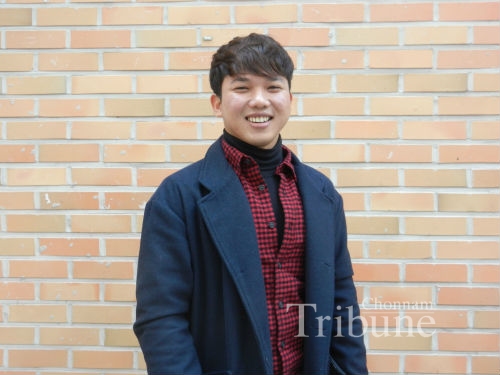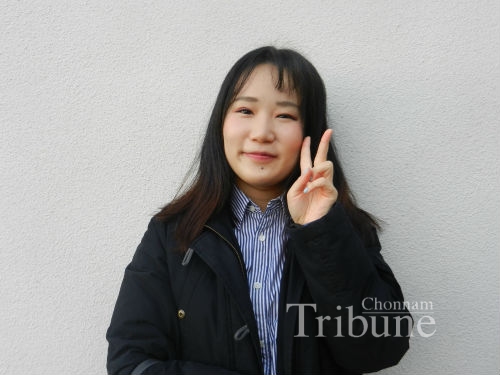One of the most interesting phrases that I have heard in Korean is “chui-oeb-nan”, which refers to the unemployment crisis in Korea. The fact that society has a term to refer to this situation shows how serious and widespread this is in Korea. A lot of students take gap years to boost their resume by participating in various activities: as an exchange student or volunteering in NGO’s. Over the years, with the increase in opportunities, the playing field for getting a job has been evened out. Two other important aspects of getting a job in Korea are the various exams that students need to write before they can graduate, and the diverse certificates or licenses to make their resume more outstanding. A Tribune reporter asked various international students on our campus about the employment situation in their country and their personal opinions on this matter.
1. What Is Your Opinion of the Struggle Finding a Job in Korea?

Syeda Shamima Nasrin, System Biology (Bangladesh)
It is very competitive in Korea. Companies want language proficiency both in Korean and English and of course very good academic grades. It is difficult for foreigners from non-East-Asian countries to get jobs since Korea has yet to expand into this market on a large scale.

Bobby Aditya Darmawan, Materials Science and Engineering (Indonesia)
The job struggle in Korea is not good in any way for the country or the youth of the country. It causes a lot of stress for young people and does not lead to much good. If the process of getting a job is modified a little bit, it may help students to feel more at ease in this situation.
2. Is It Easy or Difficult to Get a Job in Your Country? Why?
Syeda Shamima Nasrin, System Biology (Bangladesh)
Being a populous country and having more than enough graduates, most companies have more than enough applicants for most jobs that are posted. However, a common complaint from fresh graduates is that there are not enough jobs and on the other hand Hiring Managers say that it’s hard to get exactly the right person for the specific position. So overall, the job market is tougher than one can imagine.

Cao Zhiyu, Korean Language Education (China)
Even though the population in China is so high, there are just as many jobs available for students. Some jobs that may be part-time jobs in another country are turned into full-time jobs in order to support an individual and create employment opportunities. For example, in McDonalds, instead of people cleaning up after themselves, there are full-time employees that will clean your table and throw away your trash.
Bobby Aditya Darmawan, Materials Science and Engineering (Indonesia)
It is quite easy for science and engineering graduates to get jobs, since there are not many people that are specializing in these technical fields that require a lot of expertise. On the other hand, the graduates of arts majors such as social science, humanities, etc. find it quite difficult to get places since there are a lot of people in their major, making the competition fierce.

Kogawa Izumi, Korean Language and Literature (Japan)
In Japan, not only the private companies, but also the public companies, are doing quite well. This has enabled equal opportunity for students across both sectors, hence dispersing them evenly across industries. Due to this, the intensity of the competition to get a job has reduced, and getting a job is not that difficult in Japan.
3. In Your Opinion, What Achievements Are Most Attractive to Companies?
Cao Zhiyu, Korean Language Education (China)
The main specification is the undergraduate or graduate major of the students. Companies tend to pick students that have studied a major that is closely related to the sector of the job position. Even if the student does not have the ability to speak foreign languages, if they have majored in a difficult subject their chances of being hired are good.
Kogawa Izumi, Korean Language and Literature (Japan)
There are actually quite a variety of certifications to be earned and so pinpointing just a few important ones is quite difficult. But it has become quite popular for students to undertake the TOEIC exam as a way to give them a competitive advantage.
4. Do People Prefer to Work in the Public or the Private sector?
Syeda Shamima Nasrin, System Biology (Bangladesh)
Working in the public sector is more appreciated than the private sector. Although private companies pay a lot, social standards still favor public companies. I have seen some young people prefer private jobs because of the good salary package. Still, I must admit public jobs are the first choice and students are ready to take a gap year to study for BCS, an exam through which we can apply to get a civil job.
Bobby Aditya Darmawan, Materials Science and Engineering (Indonesia)
Most people prefer getting jobs in the public sector since they can earn well and have greater job security. If they work in a public company, they will not go bankrupt. Also, people who retire from public companies get a small stipend even after they retire.
The Light at the End of the Tunnel
Although there is much struggle involved in getting a job in countries like Korea or Bangladesh, there are also many countries that have expanded the variety of jobs to accommodate employment for more people. One of the common traits of all these countries is that students prefer public sector jobs to private sector jobs. In spite of the struggle, we believe that both employers and employees are changing their mindset concerning the evaluation of prospective employees. This gives hope to students that their labor is not in vain. We wish all students the best of luck in your pursuit to find a job that best reflects your passion and skills.

